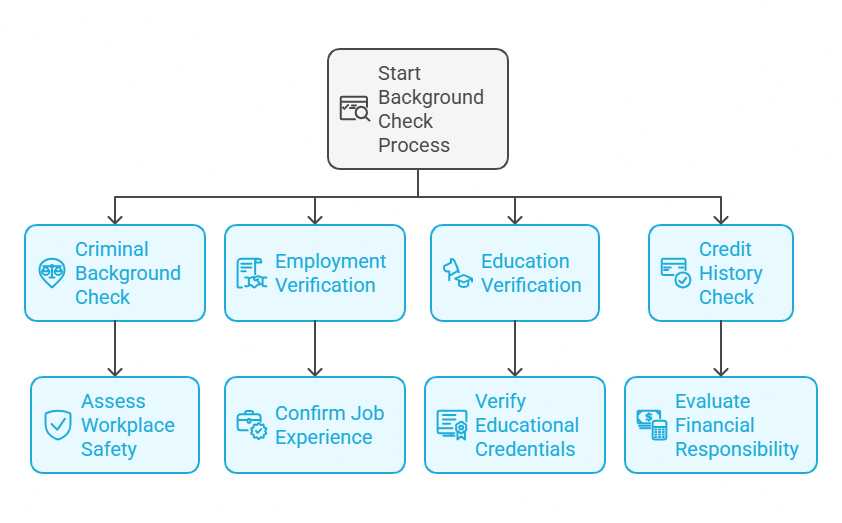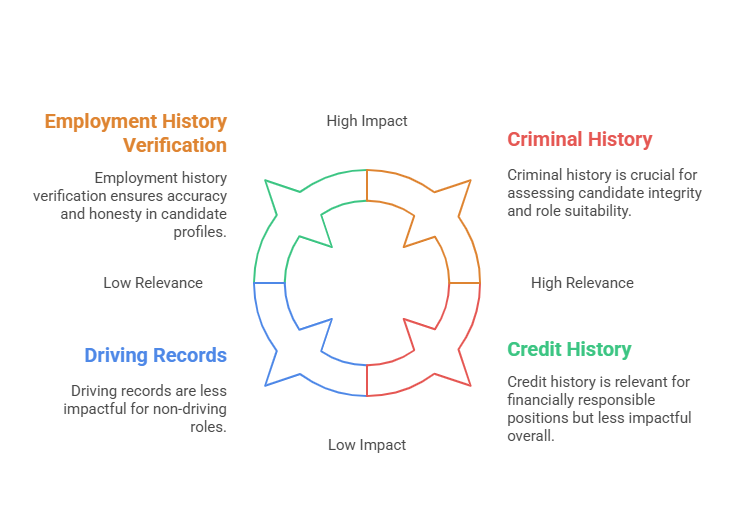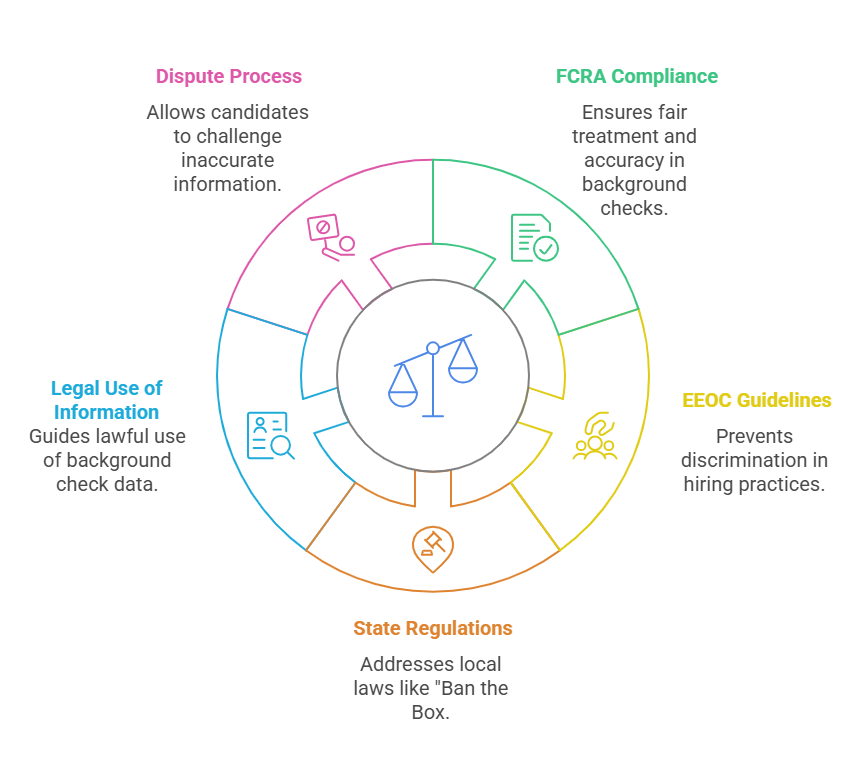Introduction to Background Checks and What Employers Look for
Background checks are an essential part of the hiring process for employers across various industries. They provide insight into a candidate’s background, which helps employers make informed hiring decisions. By verifying critical information about applicants, employers can ensure that they hire qualified individuals who pose minimal risks to their businesses.
When an employer conducts a background check, they are verifying the accuracy of the information provided by a candidate. The goal is to confirm the applicant’s qualifications, assess their potential risks, and ensure that they are a suitable fit for the role and the organization. Background checks help employers gauge whether candidates have the necessary skills, experience, and personal history to thrive in the workplace.
Employers may look for several factors during background checks, including criminal history, employment history, educational qualifications, and credit reports. These checks can reveal a candidate’s potential for success or raise red flags that may indicate a lack of trustworthiness or reliability.
Types of Background Checks Employers Conduct

Criminal Background Check
One of the most common types of background checks is the criminal background check. This check reveals whether an applicant has been involved in any criminal activities. The information typically gathered includes felony and misdemeanor charges, arrests, and convictions. Employers often use criminal background checks to assess the potential risks of hiring a candidate who may pose a threat to workplace safety, productivity, or company reputation.
Employment Verification
Employment verification is a critical part of the background check process. Employers want to verify that candidates have the experience and qualifications they claim to have. This includes confirming job titles, dates of employment, and responsibilities at previous jobs. It ensures that the candidate has the necessary experience to perform the job they are applying for and helps avoid fraudulent claims on a resume.
Education Verification
Education verification is another important aspect of background checks, particularly for roles that require specific educational qualifications. Employers may verify the degrees, certifications, and diplomas listed on an applicant’s resume to ensure they meet the required educational standards for the position. This verification also protects employers from potential hiring mistakes based on inaccurate or falsified educational credentials.
Credit History Check
In certain industries, especially those involving financial responsibilities, employers may conduct credit history checks. A candidate’s financial stability can reflect their responsibility, reliability, and overall suitability for the role. While not all employers require credit checks, they are particularly common in positions related to finance, banking, and management. However, employers must be cautious in their use of credit checks, as there are legal limitations on how they can use the information obtained.
What Employers Typically Look For in a Background Check
- Criminal History Employers often examine criminal records to determine if an applicant has any relevant criminal convictions. Serious offenses such as violent crimes, theft, or drug-related offenses can make a candidate ineligible for certain roles, especially those involving children, vulnerable populations, or high levels of trust. The relevance of the criminal history is often evaluated based on the type of job and how recent the conviction was.
- Past Employment Employers place significant emphasis on a candidate’s work history. Previous employment verification allows employers to confirm that an applicant has the necessary experience, a consistent work ethic, and a positive reputation in the workforce. Gaps in employment or patterns of short-term jobs might raise concerns for employers, signaling that the candidate could have difficulty committing to long-term positions.
- Education Verification Verifying an applicant’s educational qualifications is essential to ensure they meet the requirements for the position. Falsified or exaggerated academic credentials can be a significant red flag. In certain cases, employers may prioritize candidates with advanced or specialized degrees or certifications relevant to the position.
- Credit Report While not applicable to all job types, credit reports can be critical for positions that involve managing finances, handling large sums of money, or managing sensitive financial data. Employers may look for signs of financial responsibility or any potential risks that may indicate a lack of judgment or reliability, especially in positions where employees manage sensitive information.
Why Employers Prioritize Certain Elements in Background Checks
Employers prioritize specific elements of a background check based on the nature of the job and the associated risks. For instance, if the job involves interacting with vulnerable populations, employers will likely place more emphasis on a candidate’s criminal history. Similarly, for roles that require handling sensitive financial information, a credit check will hold greater weight.
The goal of background checks is not to penalize candidates but to ensure a safe and secure workplace for both employees and customers. By looking at factors like criminal history, employment history, and educational qualifications, employers aim to make informed hiring decisions that align with company values and regulations.
The Impact of Background Check Results on Hiring Decisions
The results of a background check can significantly influence an employer’s decision. If a background check reveals issues such as a criminal history, inconsistencies in employment, or falsified educational credentials, the employer may choose not to move forward with the candidate. On the other hand, if the background check results align with the candidate’s claims and demonstrate reliability, the employer may feel more confident in making an offer.
Employers often use background checks to mitigate risk. For instance, if an applicant has a criminal record related to theft and is applying for a job in finance, the employer may decide that the risk is too great to proceed with the candidate. Alternatively, if the applicant has a history of relevant experience and solid educational credentials, they may be considered a strong contender for the role.
The overall goal of background checks is to balance the need for workplace safety, security, and compliance with the opportunity for qualified candidates to secure employment. Employers carefully weigh all the factors gathered during background checks to make decisions that are in the best interest of their company, employees, and customers.
Key Elements Employers Look for in a Background Check
When conducting background checks, employers aim to ensure the integrity of the information provided by job candidates and assess whether they are a good fit for the position. The type of information employers look for during a background check varies depending on the industry, the role, and the specific needs of the company. However, several key elements are commonly reviewed during the background check process. Below, we will explore the most important aspects that employers look for and how they impact hiring decisions.

1. Criminal History
One of the first things employers look for in a background check is any criminal history. This includes a check for felonies, misdemeanors, and pending charges. Employers generally consider the type of crime, the severity, and how long ago it occurred. For instance, a conviction for a financial crime may be a red flag for a role involving financial responsibilities, while a minor misdemeanor might be less concerning, depending on the position.
Employers may look for:
- Felonies (severe criminal offenses)
- Misdemeanors (less severe crimes)
- Pending criminal charges
- Sex offender registry checks (if relevant to the position)
2. Employment History Verification
Employers want to confirm the accuracy of a candidate’s work history. This includes verifying the job titles held, the length of time employed at each company, the job responsibilities, and the reason for leaving previous jobs. Inaccurate or inflated work history can be a red flag, as it may signal dishonesty or a lack of integrity.
The employment history check may include:
- Job title verification
- Dates of employment
- Previous employer references
- Reason for leaving
3. Educational Verification
Employers typically verify a candidate’s educational background to confirm that the candidate holds the degrees or certifications they claim to possess. Misrepresenting academic qualifications is a serious issue that could jeopardize an applicant’s chances of being hired. Employers may also verify whether the applicant graduated from the claimed institutions.
Common aspects of educational verification include:
- Degree verification (e.g., bachelor’s, master’s, PhD)
- Certification and license checks (if relevant to the role)
- Institution attended
4. Credit History
For positions that involve handling financial responsibilities, such as banking, accounting, or senior management roles, employers often conduct credit checks. The purpose of this check is to assess a candidate’s financial responsibility. Candidates with poor credit may be seen as risky, particularly in positions where financial trust is essential. However, employers must ensure that credit checks comply with the Fair Credit Reporting Act (FCRA) guidelines, and they must obtain consent before running a credit check.
What is typically reviewed during a credit check:
- Credit score
- Outstanding debts
- Bankruptcy filings
- Payment history (e.g., missed payments, collections)
5. Drug and Alcohol Testing
For many employers, especially in industries that require high safety standards (e.g., transportation, construction, manufacturing), drug and alcohol testing is an important part of the background check. A clean drug test ensures that candidates are physically and mentally fit for work and are not under the influence while on the job.
Commonly tested substances include:
- Marijuana (depending on state laws)
- Cocaine
- Opioids
- Alcohol
6. Driving Records
If the job involves operating a vehicle, employers will often check the candidate’s driving record. This check looks for any history of traffic violations, accidents, or driving under the influence (DUI). A clean driving record is particularly important for positions that require traveling, deliveries, or the operation of company vehicles.
What is typically checked in a driving record:
- Traffic violations
- Accidents
- DUI offenses
- License suspension history
Data Table: Common Background Check Components
| Background Check Component | Description | What Employers Look For |
|---|---|---|
| Criminal History | Checks for any criminal offenses in a candidate’s past. | Felonies, misdemeanors, pending charges, and sex offender status. |
| Employment History Verification | Verifies past employment details to confirm work experience. | Job titles, dates of employment, job duties, and reasons for leaving. |
| Educational Verification | Confirms academic qualifications claimed by the candidate. | Degrees, certifications, and institutions attended. |
| Credit History | Assesses financial responsibility, particularly in financial roles. | Credit score, outstanding debt, bankruptcy filings, and payment history. |
| Drug and Alcohol Testing | Tests for substance abuse, especially in safety-critical roles. | Positive or negative drug test results for specific substances. |
| Driving Records | Reviews driving history, especially for roles that involve driving. | Traffic violations, accidents, DUI offenses, and license suspensions. |
7. Other Checks and Considerations
While criminal history, employment history, education, credit, drug tests, and driving records are the most common checks, some employers may also perform other types of background checks depending on the job. For example, candidates for high-security positions may undergo more extensive checks, including security clearance verification or checks related to foreign associations.
Employers may also look for:
- Professional licenses (especially for roles like healthcare or law)
- Social media screening to assess personality and fit
- References from colleagues, supervisors, or industry professional
Our Services at Rapid Hire Solutions
At RapidHireSolutions, we specialize in providing comprehensive background check services that ensure compliance with state, federal, and industry-specific regulations. Our team is dedicated to helping employers streamline the background screening process while maintaining accuracy and legal adherence. Whether it’s criminal history checks, employment verifications, credit reports, or other pre-employment screenings, our services are tailored to meet the unique needs of your business. We pride ourselves on delivering fast, reliable, and secure background checks that help employers make informed hiring decisions while minimizing the risk of legal complications.


